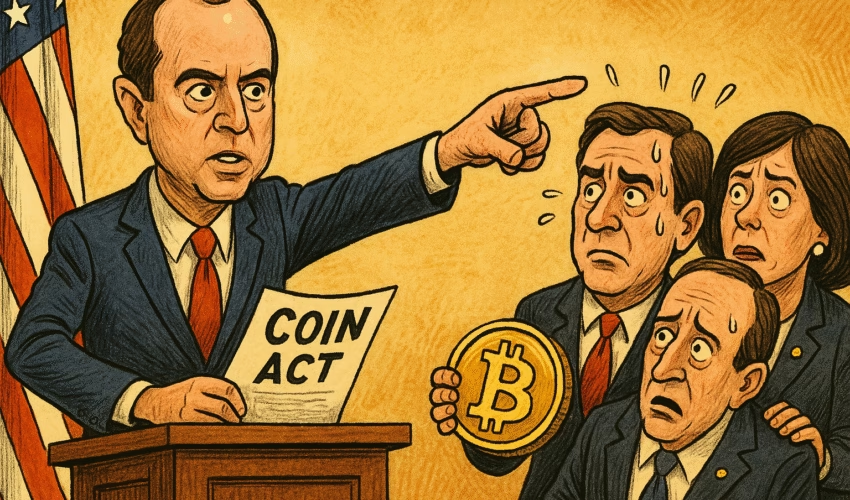Legislation targets potential conflicts of interest amid Trump family’s cryptocurrency ties
A group of Democratic senators led by Senator Adam Schiff introduced new legislation on Monday aimed at limiting the ability of U.S. presidents and other public officials to profit from digital asset ventures during and after their time in office.
The proposed bill, titled the Curbing Officials’ Income and Nondisclosure (COIN) Act, would impose strict rules on public officials, including a ban on issuing, sponsoring, or endorsing cryptocurrencies, memecoins, stablecoins, and non-fungible tokens (NFTs) for a period extending from 180 days before taking office to two years after leaving.
Response to Trump’s Crypto Ties
The legislation was introduced in direct response to reports that President Donald Trump received $57.4 million in income linked to World Liberty Financial (WLF) — a crypto platform backed by his family.
“President Donald Trump’s cryptocurrency dealings have raised significant ethical, legal and constitutional concerns over his use of the office of the presidency to enrich himself and his family,” said Senator Schiff. “That’s why I am introducing legislation to prevent the financial exploitation of any digital assets by public officials.”
Donald Trump and other senior administration officials have made a fortune off of crypto schemes.
Today, I’m introducing the COIN Act to put a stop to this corruption in plain sight. pic.twitter.com/8wieNSCPgC
— Adam Schiff (@SenAdamSchiff) June 23, 2025
The legislation is supported by nine other Democratic senators and comes amid broader scrutiny of Trump’s involvement in crypto-related ventures, including the USD1 stablecoin issued by WLF in March.
Stablecoin Activity and International Investment
WLF’s USD1 stablecoin has drawn international attention, with a $2 billion investment in Binance reportedly settled using the asset by an Abu Dhabi-based firm in May. While the Trump family previously held a 75% stake in WLF, their ownership was reportedly reduced to 40% by June, with potential proceeds from the sale estimated in the tens of millions of dollars.
According to a report by the nonpartisan watchdog State Democracy Defenders Action, the president’s digital asset holdings are now valued at approximately $2.9 billion, making up around 40% of his total net worth.
Similar Legislation in the House
The COIN Act follows a companion bill introduced in the House of Representatives by Congresswoman Maxine Waters, known as the TRUMP in Crypto Act. That legislation also aims to prohibit public officials — particularly President Trump — from leveraging crypto assets for personal financial gain while in office.
Waters’ proposal coincided with Trump’s private dinner to honor top holders of his memecoin, a move seen by critics as a conflict of interest and misuse of political influence.
Legislative Outlook and Political Landscape
While the bills mark the first serious effort in Congress to regulate crypto activity by public officials, their prospects remain uncertain. With Republicans holding slim majorities in both chambers, it is unlikely that either bill will pass without bipartisan support.
Even if passed, both bills face a high likelihood of a presidential veto, which would require a two-thirds majority in both the House and Senate to override — a threshold that is currently out of reach for the Democratic minority.
Implications for the Crypto Industry
The COIN Act reflects growing concern in Washington about the intersection of political power and digital asset investments, particularly as more lawmakers, companies, and institutions adopt cryptocurrency-focused strategies.
With Trump Media’s continued push into Bitcoin ETFs and digital asset treasuries, any regulatory limitations on presidential influence over digital assets could have far-reaching implications for both the crypto markets and political fundraising landscapes in the U.S.












